Latest Research Publications
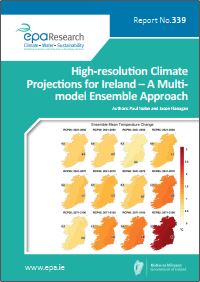
Research 339: High-resolution Climate Projections for Ireland – A Multi-model Ensemble Approach
Authors: Paul Nolan and Jason Flanagan, September 2020
Year: 2020
In this study, regional climate models were employed to dynamically downscale the coarse information of Global Climate Models to provide detailed projections of 21st-century regional climate change in Ireland. The projections were run at high spatial resolution (4 km grid spacing), allowing a more accurate evaluation of the local impacts of climate change.
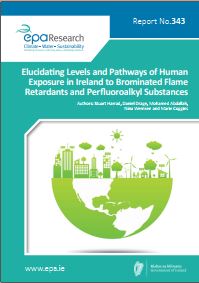
Research 343: Elucidating Levels and Pathways of Human Exposure in Ireland to Brominated Flame Retardants and Perfluoroalkyl Substances
Authors: Stuart Harrad, Daniel Drage, Mohamed Abdallah, Nina Wemken and Marie Coggins, September 2020
Year: 2020
Brominated flame retardants (BFRs) and perfluoroalkyl substances (PFASs) have been used extensively in applications such as electrical goods, soft furnishings and building insulation foam. The ELEVATE project generated data to facilitate the assessment of human exposure to these chemicals.
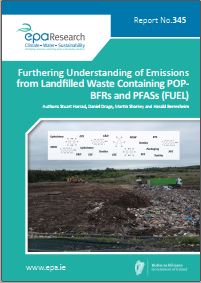
Research 345: Furthering Understanding of Emissions from Landfilled Waste Containing POPBFRs and PFASs (FUEL)
Authors: Stuart Harrad, Daniel Drage, Martin Sharkey and Harald Berresheim, September 2020
Year: 2020
Brominated flame retardants (BFRs) and perfluoroalkyl substances (PFASs) have been used extensively in applications such as electrical goods, soft furnishings and building insulation foam. The FUEL project measured these chemicals in leachate from landfills, and collected air, soil and groundwater samples traceable to these landfills to further investigate.

Research 338: Greening Transport: Final Report
Authors: Brian Caulfield, Paraic Carroll, Shreya Dey, Bidisha Ghosh and Aoife Ahern, August 2020
Year: 2020
The Greening Transport project examined the behavioural response of commuters within the Greater Dublin Area, to a range of policy incentives to encourage travellers to make greater usage of sustainable travel modes for trips to places of work or education. The results suggest that policy incentives alone could lead to tangible improvements in commuting time and cost constitute valuable guidance and recommendations for policymakers.
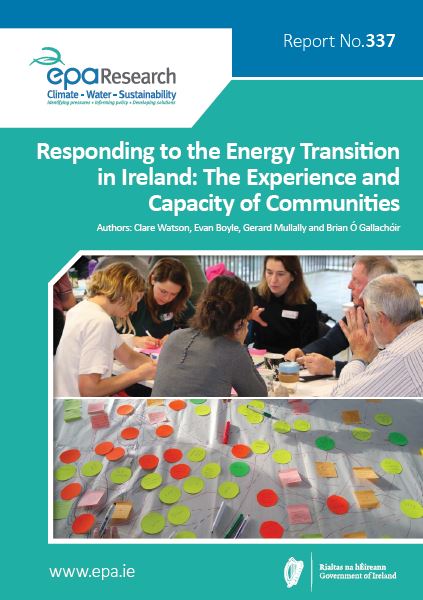
Research 337: Responding to the Energy Transition in Ireland: The Experience and Capacity of Communities
Authors: Clare Watson, Evan Boyle, Gerard Mullally and Brian Ó Gallachóir, August 2020
Year: 2020
Recently, Ireland has witnessed a significant increase in interest in and policy focus on the role of citizens and communities in the energy transition to a low-carbon future. This research project has engaged with community energy groups over a 3-year period and investigated how we might support the development of community capacity to effectively engage in energy transitions.
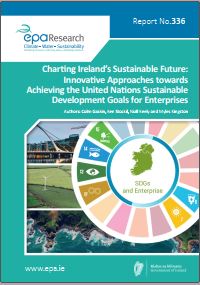
Research 336: Charting Ireland’s Sustainable Future: Innovative Approaches towards Achieving the United Nations Sustainable Development Goals for Enterprises
Authors: Colm Gaskin, Ken Stockil, Niall Keely and Myles Kingston, August 2020
Year: 2020
The Sustainable Development Goals (SDGs) are a call for change – a change to how we live, work, think and interact, both with each other and with our environment, to protect and secure our future and the future of the planet. This report captures the key recurring themes from Ireland’s engagement to date with the seven environmental SDGs and its role in supporting the private sector to deliver impactful contributions to these SDGs.
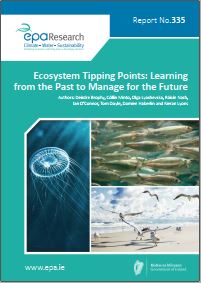
Research 335: Ecosystem Tipping Points: Learning from the Past to Manage for the Future
Authors: Deirdre Brophy, Cóllín Minto, Olga Lyashevska, Róisín Nash, Ian O’Connor, Tom Doyle, Damien Haberlin and Kieran Lyons, August 2020
Year: 2020
Marine ecosystems are undergoing unprecedented change, with natural capital declining to the point that benefits accrued by humans are at risk. This project aimed to collate and integrate datasets describing the Celtic Sea ecosystem, and to use this data to quantify how physical and biological ecosystem components have changed in recent decades and to establish relationships between ecosystem responses and external pressures.
Environmental impacts (positive and negative) flowing from COVID-19 and related measures
Authors: Eileen O’Leary, Safaa Al Tameemi, Sarah Broderick and Colman McCarthy, August 2020
Year: 2020
This report presents the findings from a small-scale research study on the main environment-related impacts arising from the COVID-19 experience in Ireland, both positive and negative. While focused primarily on the environmental effects, related effects such as changes in consumption, which have knock-on environmental impacts are also included.
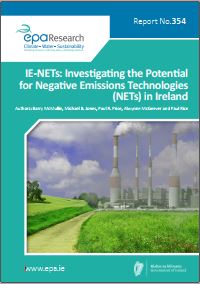
Research 334: Sustainable Voluntary Communities: Support for Sustainable Environmental, Social and Economic Development
Authors: Bernadette O’Regan, Richard Moles, Rosemary Byrne and Anne Bennett, August 2020
Year: 2020
The need to involve voluntary communities at local level in the implementation of successful sustainable development programmes to achieve reductions in greenhouse gas (GHG) emissions is widely recognised. This research identified 36 Irish communities that were, or were actively planning to be, involved in local-scale action to enhance sustainability. Six of the 36 were selected for this research project.
Covid-19 and Sheer Wellbeing 2020 - Access to and Use of Blue/Green Spaces in Ireland during a Pandemic
Authors: Gesche Kindermann, Christine Domegan and Sinead Duane, August 2020
Year: 2020
This Small-Scale Study looked at the access to and use of blue/green spaces in Ireland during a Pandemic. This report builds upon and extends Our Environment, Our Health, Our Wellbeing: Access to Blue/Green Spaces and Water Quality in Ireland (2017-HW-MS-12).
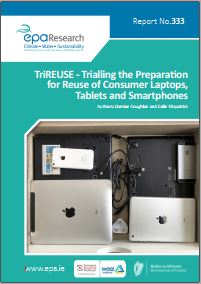
Research 333: TriREUSE – Trialling the Preparation for Reuse of Consumer Laptops, Tablets and Smartphones
Authors: Damian Coughlan and Colin Fitzpatrick, August 2020
Year: 2020
Information and communication technology (ICT) devices contain critical raw materials. The TriREUSE project aimed to provide an insight into possible reuse rates for WEEE collections that target consumer ICT products with reuse potential. The project involved a series of 10 dedicated collection events that encouraged people to dispose of old or unwanted data-bearing devices, with the incentive of a free data destruction service.
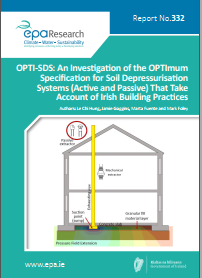
Research 332: An Investigation of the Optimum Specification for Soil Depressurisation Systems (Active and Passive) That Take Account of Irish Building Practices
Authors: Le Chi Hung, Jamie Goggins, Marta Fuente and Mark Foley, July 2020
Year: 2020
In Ireland, Radon is the second biggest cause of lung cancer and it is estimated that 9% of homes exceed the reference level of Radon. Studies in other countries have indicated that the effectiveness of passive sumps is enhanced by sealing across the base of the building. This project examines the characterisation of the T1 Struc and T2 Perm specified granular fill materials for soil depressurisation systems for buildings.

Research 331: IMPLiCIt: IMProving inversion modeL Capability in Ireland
Authors: Colin O’Dowd, Damien Martin and Dèlia Arnold, July 2020
Year: 2020
The IMPLiCIt project aims to develop a combined measurement and modelling system to verify methane sources over Ireland and regions affecting the Irish domain, and to improve Irish national capacities to estimate and verify national methane and other greenhouse gas (GHG) emissions inventories.
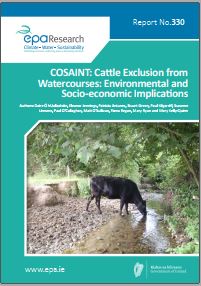
Research 330: COSAINT: Cattle Exclusion from Watercourses: Environmental and Socio-economic Implications
Authors: Daire Ó hUallacháin, Eleanor Jennings, Patricia Antunes, Stuart Green, Paul Kilgarriff, Suzanne Linnane, Paul O’Callaghan, Matt O’Sullivan, Fiona Regan, Mary Ryan and Mary Kelly-Quinn, July 2020
Year: 2020
Loss of pollutants from grassland systems to water bodies is a significant threat to water quality and represents one of the main environmental problems facing agri-ecosystems in Ireland. This project evaluated existing literature and generated temporal and spatial data on the environmental impact of cattle exclusion measures.
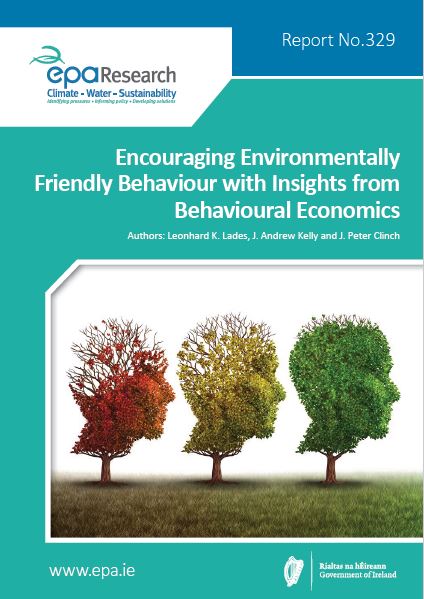
Research 329: Encouraging Environmentally Friendly Behaviour with Insights from Behavioural Economics
Authors: Leonhard K. Lades, J. Andrew Kelly and J. Peter Clinch, July 2020
Year: 2020
The 2019 Climate Action Plan sets out targets for Ireland in sectors including transport, residential heating and waste. To achieve these targets, infrastructure investments are essential. However, infrastructure investments are not enough, the investments must be paired with broad behavioural change. This report aims to support environmental policymaking in Ireland with the goal of encouraging environmentally friendly behaviour.
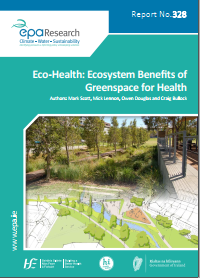
Research 328: Eco-Health: Ecosystem Benefits of Greenspace for Health
Authors: Mark Scott, Mick Lennon, Owen Douglas and Craig Bullock, July 2020
Year: 2020
This project advances the perspective that accessible and well-designed green spaces are essential infrastructure that is fundamental to the health and well-being of thriving and inclusive communities. There is a scientific consensus that green space provides multiple benefits for enhancing health and well-being, and these benefits provided by green space are increasingly recognised in policy at international, national and local levels.
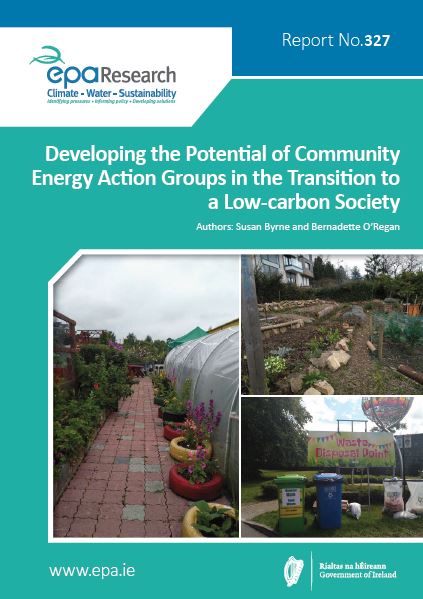
Research 327: Developing the Potential of Community Energy Action Groups in the Transition to a Low-carbon Society
Authors: Susan Byrne and Bernadette O’Regan, July 2020
Year: 2020
In Ireland, approximately 38% of the population live in rural regions. Rural populations contribute significantly more to carbon dioxide equivalent emissions in the transport and residential energy sectors than their urban counterparts. In relation to community sustainability, this report evaluates the opportunities for rural communities in low-carbon transition in relation to energy, waste, transport and other contributing factors.

Research 326: The Role of Energy Technology in Climate Mitigation in Ireland: Irish TIMES Phase 3
Authors: Brian Ó Gallachóir, Paul Deane, James Glynn, Fionn Rogan, July 2020
Year: 2020
The continued rise in transport activity, energy consumption and emissions can be attributed to economic, technological and societal factors. A range of technoeconomic and socioeconomic analytical tools and models were developed and employed in this project to generate an evidence base that can inform decarbonisation-focused transport sector decision-taking and policymaking.
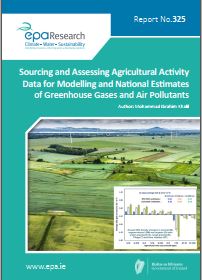
Research 325: Sourcing and Assessing Agricultural Activity Data for Modelling and National Estimates of Greenhouse Gases and Air Pollutants
Author: Mohammad Ibrahim Khalil, July 2020
Year: 2020
This project aimed to inform efforts at combating climate change as a core national priority in the pursuit of a sustainable, low carbon economy in compliance with international obligations to reduce emissions of greenhouse gases (GHGs) and air pollutants and increase soil organic carbon (SOC) sequestration.
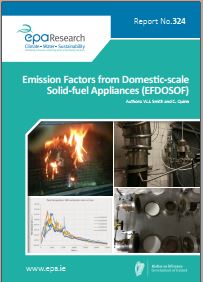
Research 324: Emission Factors from Domestic-scale Solid-fuel Appliances (EFDOSOF)
Authors: W.J. Smith and C. Quinn, July 2020
Year: 2020
The Emission Factors from Domestic-scale Solid-fuel Appliances (EFDOSOF) study set out to establish representative, real-world emission factors (EFs) for the range of solid fuels used for residential combustion in Ireland. The improved EFs developed during this study will inform and improve Ireland’s response to the UNECE Convention on Long-range Transboundary Air Pollution and to the EU National Emission Ceilings Directive.